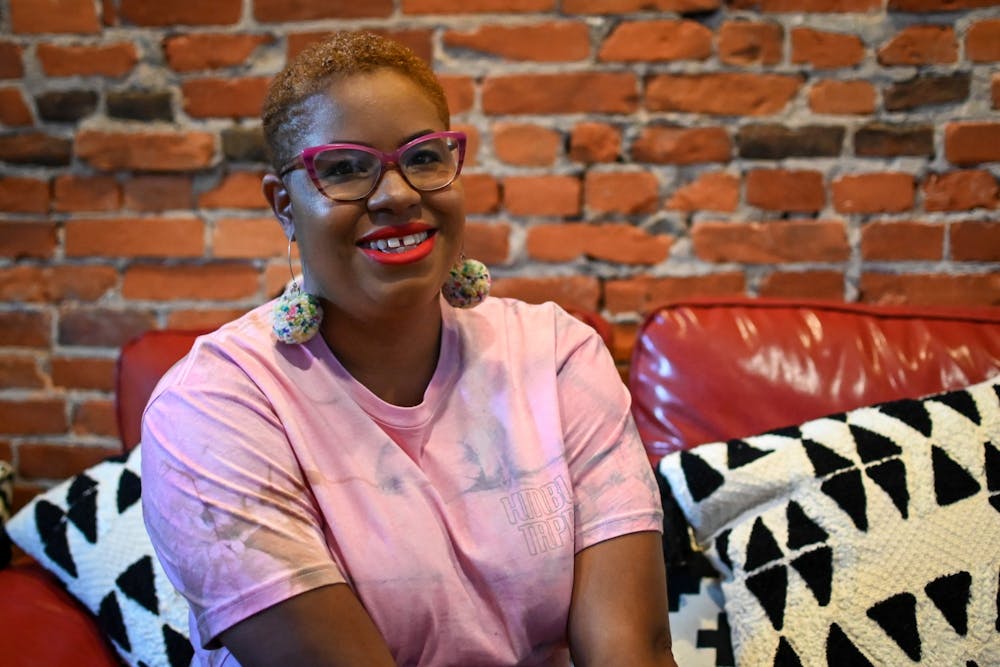
April Perry-Mckellar, owner of The Pink Lapel, has added face masks to her line of products as a result of the COVID-19 pandemic.
Business owners across the country continue to face a multitude of challenges due to the COVID-19 pandemic. While some owners are beginning to reopen, many are still feeling the economic effects of the pandemic and are reimagining the future of their businesses.
Since the rise of the global Black Lives Matter movement in June over the police killing of George Floyd and many other Black individuals, Black-owned businesses have received heightened attention and financial support from their customers. Black-owned businesses are still bearing the brunt of the pandemic, however, as they often have smaller employment sizes and receive fewer benefits from federal stimulus programs, according to The New York Times.
Here are the stories of six Black-owned small businesses in Philadelphia, and how they have been affected by the global pandemic, the resulting recession, and a worldwide racial reckoning.
Coffee Cream & Dreams
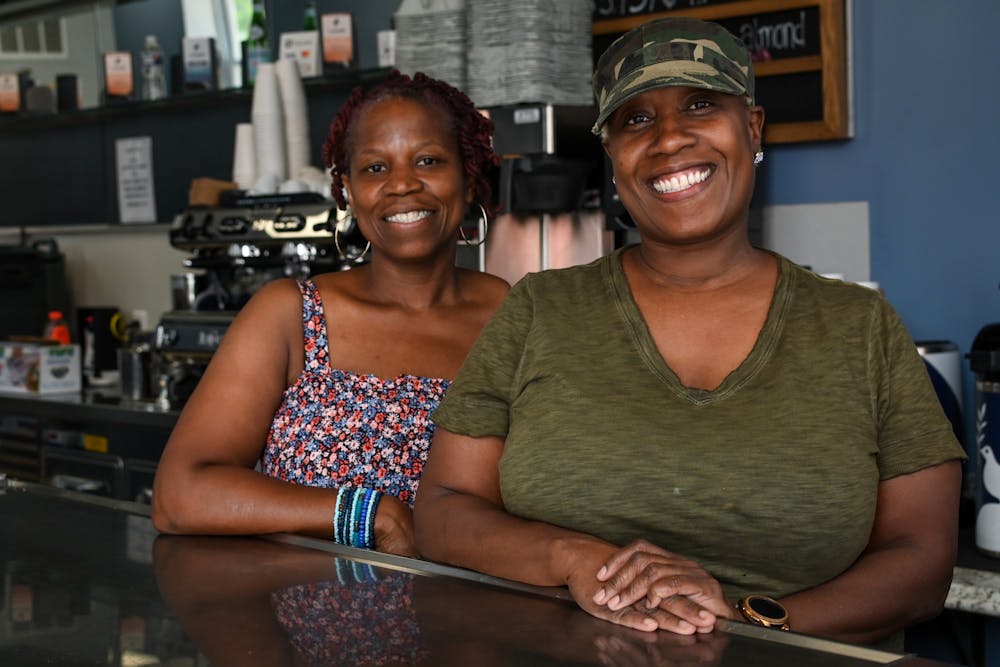
Since October 2019, Coffee Cream & Dreams co-owners Stephanie Ford (left) and Sonja West (right) have been waking up early to begin brewing coffee. From the moment they open the shop's door to when they flip over the door sign to read “CLOSED,” customers file in to purchase a cup of coffee and indulge in a bag of baked goods. Many are regulars and stay to chat with Ford and West, who emphasize the importance of making customers feel welcome.
“You can make someone’s day just by saying ‘good morning,’” Ford said.
The relationships Ford and West have built with their customers have proven so strong that, even as the COVID-19 pandemic temporarily closed many businesses for months, Philadelphia's Fairmount community continued to show up in support of Coffee Cream & Dreams.
After the city announced coronavirus restrictions that prohibited dine-in services, the shop closed for three days in March to set up an online ordering system, reopened for take-out only services, and reduced their hours of operation. Orders for coffee and gift cards continued to flow in and soon, the shop began donating coffee and pastries to essential workers, including those at Penn Presbyterian Medical Center.
Due to the pandemic, Ford and West expect to continue implementing the shop's shorter operational hours and its new online ordering system.
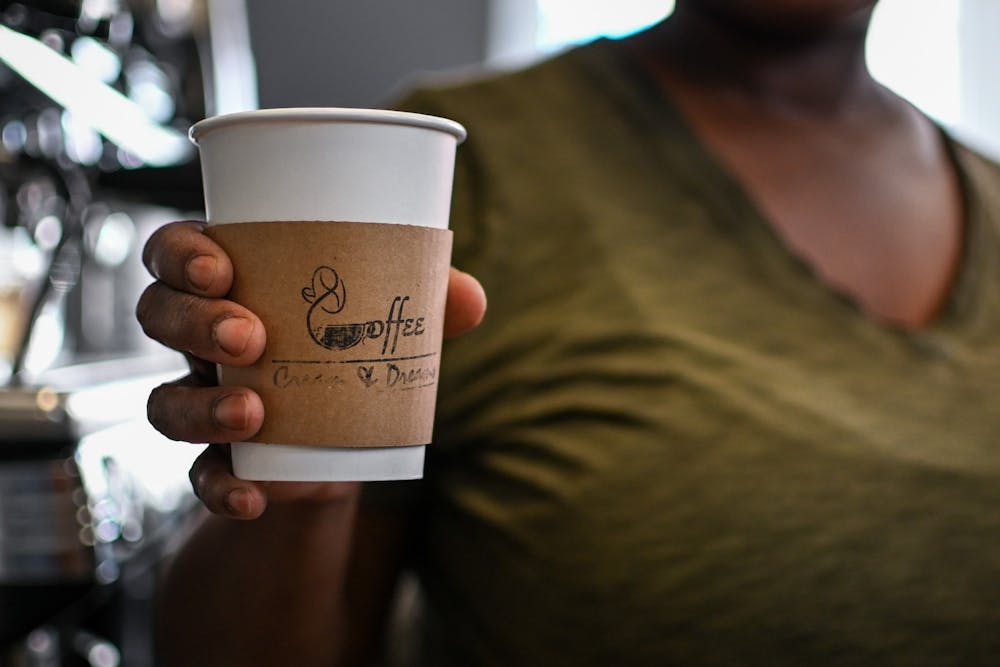
The local community has also shown its support for Coffee Cream & Dreams throughout the Black Lives Matter movement. When businesses were vandalized during the Philadelphia protests, someone placed a sign on the shop window that read “This is Black-owned business. Do not trash this building.” Ford and West still don’t know who put it up.
After lists of Black-owned businesses were created and shared across social media platforms, Coffee Cream & Dreams witnessed a significant increase in Instagram followers and tags. The shop's revenue for the month of June was the highest it has ever been. While some customers haven't been able to visit lately due to financial restraints caused by the pandemic, Ford and West said the shop has seen new customers emerge from the push to support the Black community.
“We’re still here,” Ford said. “And people are still happy that we’re here. They need coffee.”
Coffee Cream & Dreams is located in Fairmount at 1500 Fairmount Ave.
The Pink Lapel
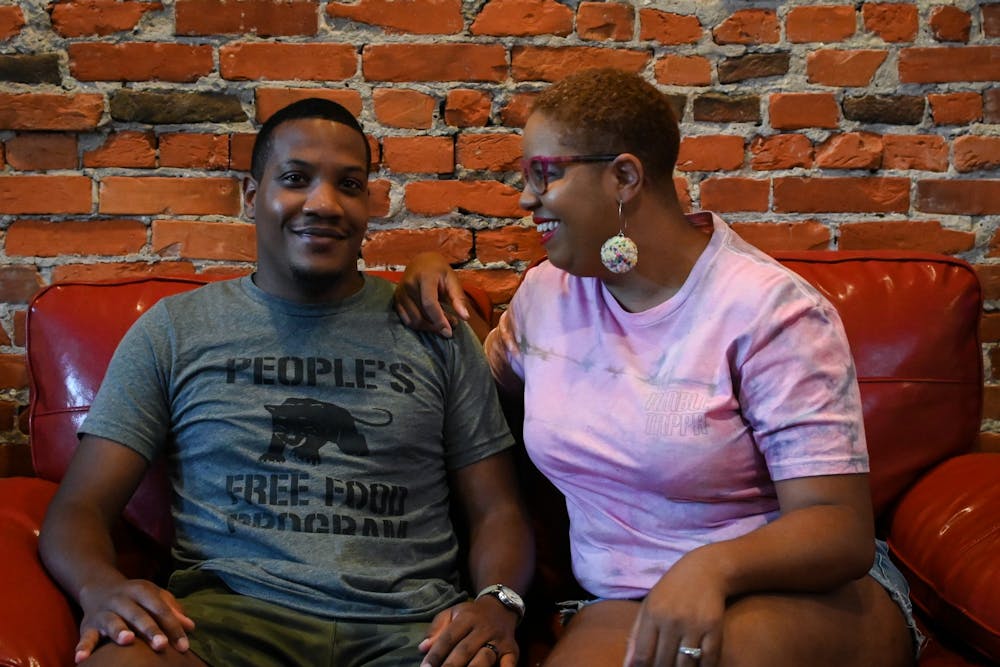
April Perry-Mckellar (right) made hand-sewn ties for her husband, Jimmy Burks (left), and his two business partners for a 2014 corporate launch event. Drawn to the ties' vibrant floral patterns, people began to ask about their origins. As people increasingly expressed interest in Perry-Mckellar's creations, Burks suggested she independently sell her cloth accessories.
And so, The Pink Lapel was born.
Perry-Mckellar began vending at arts and crafts shows in the fall of 2014, producing additional men’s accessories like bowties, pocket squares, and lapel pins. The products have since expanded to a variety of accessories, such as headbands, scrunchies, and earrings — all of which she creates at her in-home studio. The Pink Lapel can now be found on Etsy and some brick-and-mortar stores in Philadelphia, but it is still the in-person events that attract customers through word-of-mouth.
“Up until this year, we would make by far way more money in our in-person events than we did off the website,” Perry-Mckellar said.
This year, of course, COVID-19 brought arts and crafts events to an end. But, instead of hindering business, the pandemic brought the opportunity to create something new in March: face masks.
“Originally, I had just started donating the masks to hospital workers, nurses — whoever — because, remember, it was a huge shortage,” Perry-Mckellar said.

The first donation she made was to Penn Medicine’s Department of Anesthesiology and Critical Care. With the help of a friend, she has donated about 350 masks to various other Philadelphia hospitals and women and family shelters.
The Pink Lapel has also seen an increase in sales and white allyship because of the Black Lives Matter movement; white customers have made more purchases and have reached out to Perry-Mckellar with compliments on how beautiful her products are.
But, perhaps more importantly, the movement has given Perry-Mckellar a new perspective. Until recently, she only emphasized being a small, local, woman-owned business.
“I was always concerned, like pushing the whole Black-owned business, would that alienate certain customers?” Perry-Mckellar said. “And I realized, after this and everything that's going on, that doesn't really matter. I don't need those sales.”
The Pink Lapel is based in West Philadelphia.
SmileyFitNation
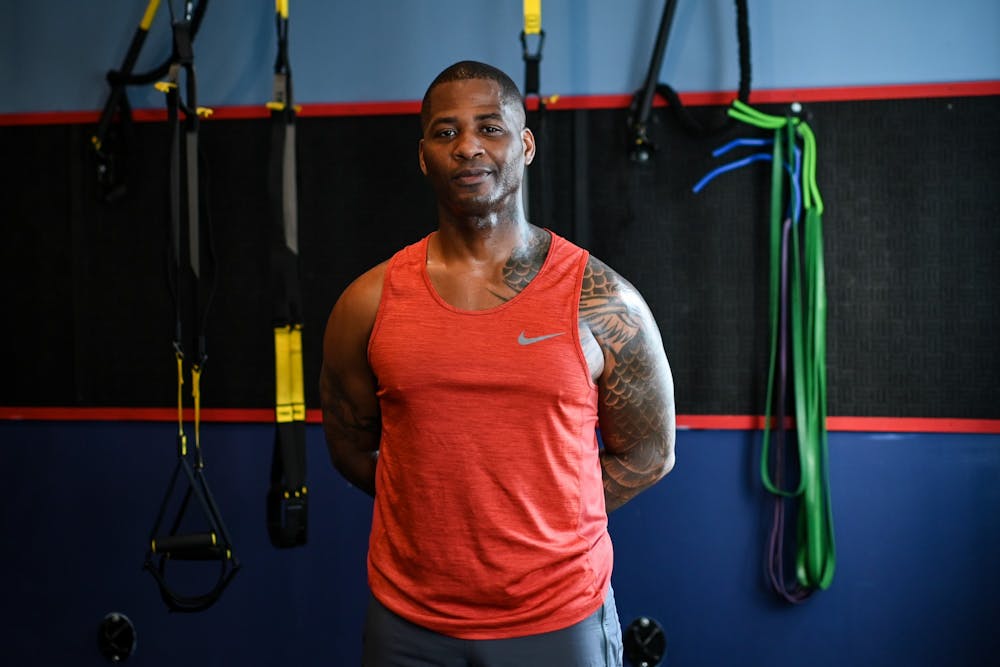
Deryl Smiley has been passionate about fitness since he was a child. In 2000, he created SmileyFitNation and, at first, ran the company out of various gyms as an independent. Nine years later, he made the shift to outdoor and online training classes and boot camps, working with clients across the Northeast and Mid-Atlantic regions. Throughout this time, he worked to obtain collateral in order to open a physical location. Finally, in 2017, he was able to open SmileyFitNation’s own physical studio in Center City and has been there ever since.
The studio is simple: one room with TRX suspension bands hanging from the ceiling and attached to the walls. But over the past few months, the studio has been mostly empty and the equipment untouched.
Smiley has had to return to conducting outdoor classes and Zoom sessions. Although SmileyFitNation is a small boutique studio, it still must adhere to COVID-19 regulations on gyms.
“It's been a challenge because, whereas we thought after quarantine, everybody would be able to go back in and people would be hungering to go back in, people are still a little standoffish towards human interaction,” Smiley said.
SmileyFitNation has also faced challenges because of the Black Lives Matter protests. On May 31, the first day of the Philadelphia protests, people who participated in the protests attempted to smash the windows of the studio's building. The glass is shatterproof, so no one was able to reach past the front door.
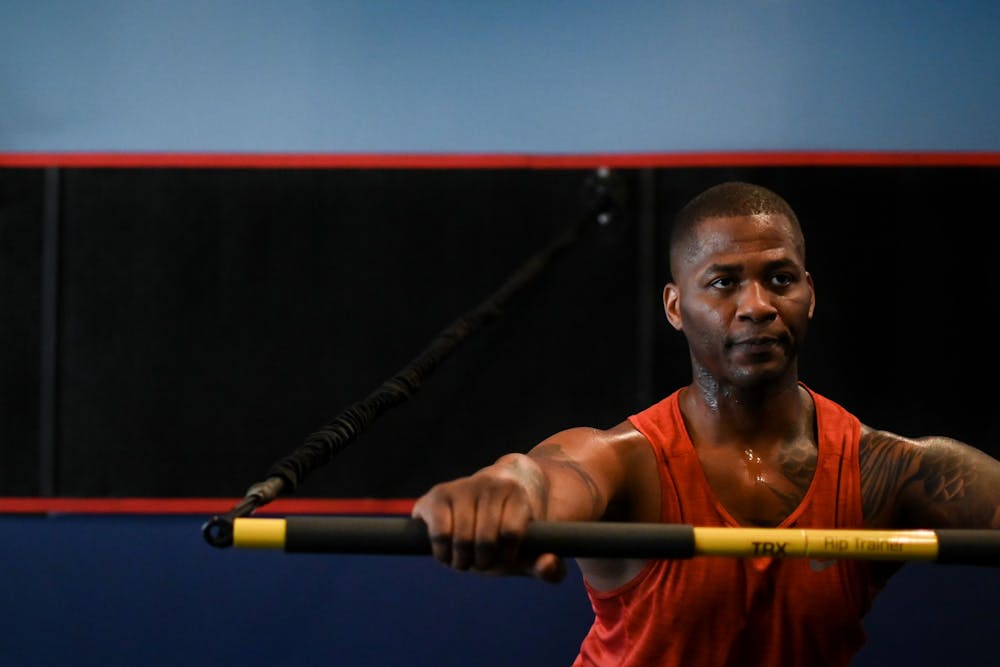
Smiley said he has also noticed how online workout classes can be difficult to fit into one’s schedule, as he's observed that people have used the extra free time to work on home improvements or spending time with family.
“Also, you're in your home; you have to overcome that mental hurdle of ‘this is not the place where I get stronger,’” Smiley said.
Those who have participated in classes, both outdoor or virtually, have given positive feedback. Though the participants cannot interact closely with a trainer or use the studio equipment, trainees have still been able to pull from the toolbox of skills Smiley taught them in person.
Throughout this time, SmileyFitNation has also been able to offer one-on-one personal training sessions in the studio with the assurance of many safety precautions, such as the installment of air purifiers, touchless thermometers, ultraviolet wands, top-tier sanitizer sprays, and individual wrappings for the TRX bands. Moving forward, there will be a more contactless approach to instruction and a continued focus on expanding trainees’ repertoires.
“How to cue an individual to move their body and teach them is exactly what the responsibility has always been, and we're just driving it home now,” Smiley said.
SmileyFitNation is located in Center City at 1923 Chestnut St.
V Marks the Shop
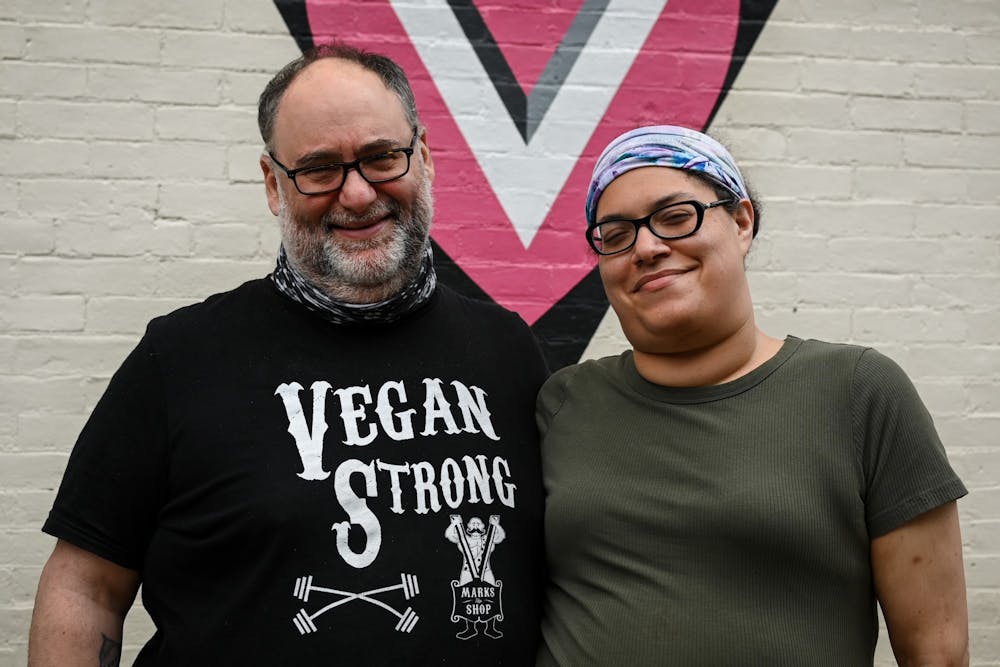
When Carmella Lanni (right) and Carlo Giardina (left) were running a vegan food blog, they casually tossed around the idea of opening a vegan business. After the husband-wife duo attended a 2015 vegan food bloggers conference, Giardina announced the couple would open a vegan store in Philadelphia — much to the surprise of Lanni. From that moment on, the seed for V Marks the Shop was planted.
Lanni and Giardina began selling vegan products at pop-ups throughout New York City, and worked their way to Philadelphia by initially hosting events throughout the city. Their first event was Philly MAC-Down in May 2016, and the following month they launched Philly Vegan Pop Flea. Finally, V Marks the Shop opened the doors of its permanent physical location in March 2019, selling vegan foods, health products, and home goods.
“We build ourselves as a vegan convenience store, because our goal is to show how accessible veganism as a lifestyle is,” Lanni said.
Extending its reach beyond veganism, V Marks the Shop also makes it a priority to be accessible to people of all backgrounds. The owners have hosted vegan events specifically for female vendors and queer vendors, and have held in-store parties for religious holidays such as Chanukah and Passover. Because of COVID-19, they had to postpone their annual Power of Color Market, for vendors of color, as well as parties celebrating Ramadan and Eid-al Fitr.
The pandemic also paused their plan to begin hiring employees, as Lanni and Giardina did not want to risk exposure to the virus. Although they stopped permitting in-store shopping in March, customers still clamored to place online and phone orders for delivery and curbside pick-up. As the couple worked 12 to 14-hour days to fulfill upwards of 200 orders per week, they made the decision to scale back operations.
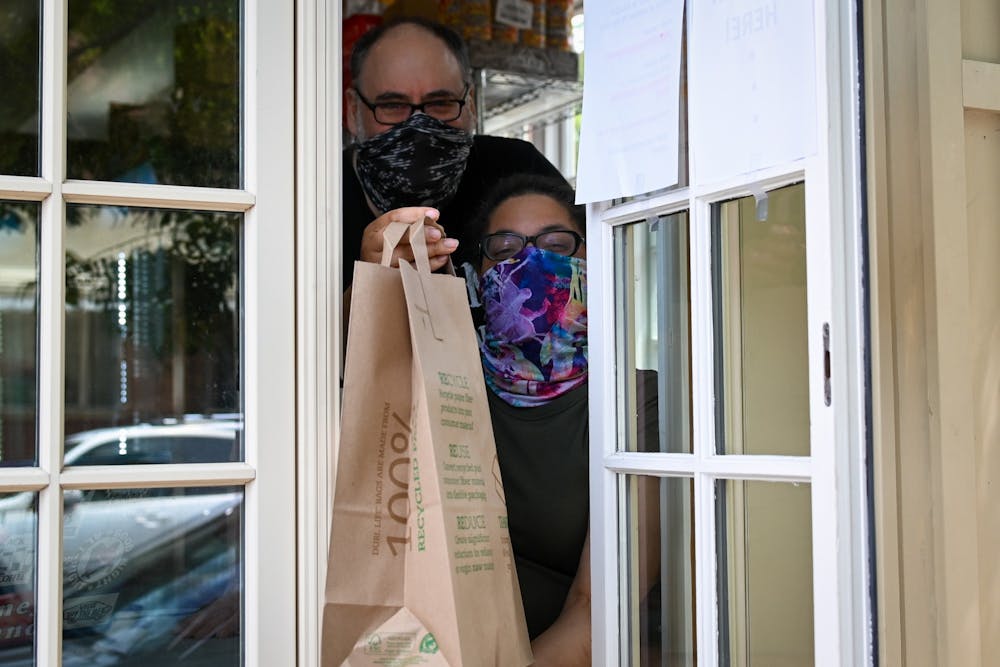
Erring on the side of caution, Lanni and Giardina plan to reopen V Marks the Shop to foot traffic a month after most other stores do.
“We're very aware that it could hurt us as a business, but I’d rather feel good about people being safe than whatever profits we get,” Lanni said.
They also hope to implement an appointment system to allow people to shop within a specific timeframe, and will ensure further safety by installing plexiglass at the register and making customers wear masks and gloves.
From the rise in the Black Lives Matter movement, Lanni believes people have become more aware that Black-owned businesses exist and are in local communities.
“There are so many misconceptions out there about who we are as people and what we contribute, other than being a hip hop artist, being a one-of-a-kind celebrity, being a criminal,” Lanni said. “We do a lot more as a people that a lot of people won't give us credit for. The Black community is very strong. We're also very smart. We’re business-minded. We make money. We give back.”
V Marks the Shop is located in South Philadelphia at 1515 McKean St.
Affinity Confections
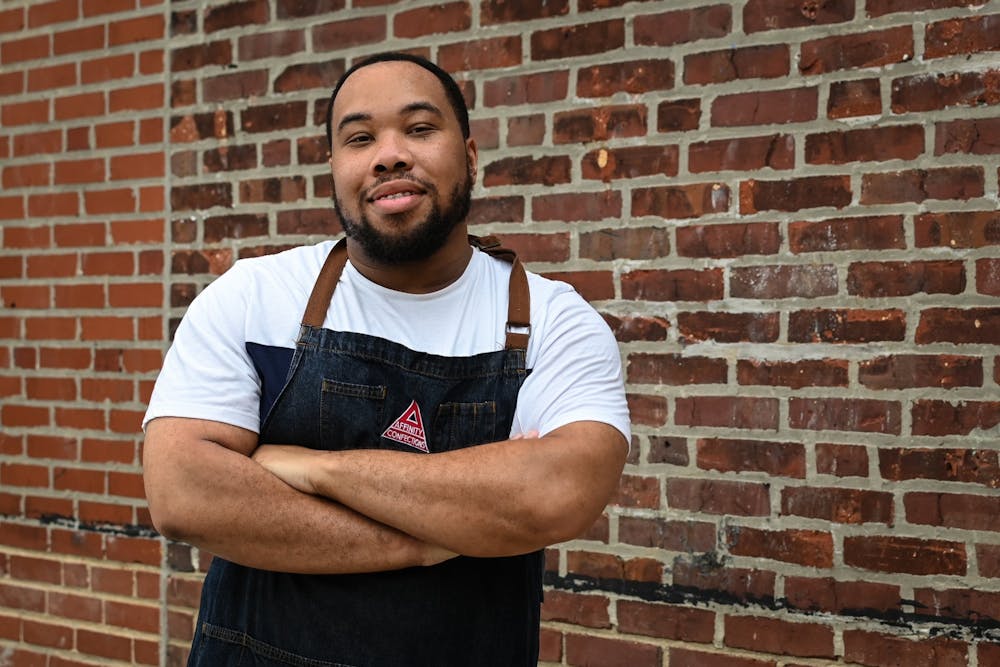
As a child, Joe Green spent much time in the kitchen with his grandmother. Baking was not only a way for them to bond, but it also provided a sense of comfort between the two. While studying entrepreneurship at Temple University, he decided to pursue baking as his lifelong career.
“I interned at the Night Kitchen Bakery in Chestnut Hill while I was at Temple and kind of fell back in love with [baking],” Green said.
So for the past six years, Green has been making desserts and pastries as the owner of Affinity Confections. The name of the business reaches to the very heart of what Green hopes to accomplish with his creations: "affinity" alluding to the best possible relationship between pairings and "confections" meaning something sweet. With the focus of creating rich flavors over elaborate designs and presentations, Green and his team have been able to create goods for people and businesses all across Philadelphia.
Affinity Confections works with many corporations and universities, including Penn Dining. When the pandemic forced businesses' in-person operations to cease and events were subsequently canceled, orders slowed down. When orders do come in, Green allocates them to his bakers so they can continue receiving some salary.
Green has taken the increased time from the pandemic to focus on business operations, such as reaching out to customers, posting on social media, and applying for additional funding from the state. Affinity Confections was awarded a grant from the University City District.
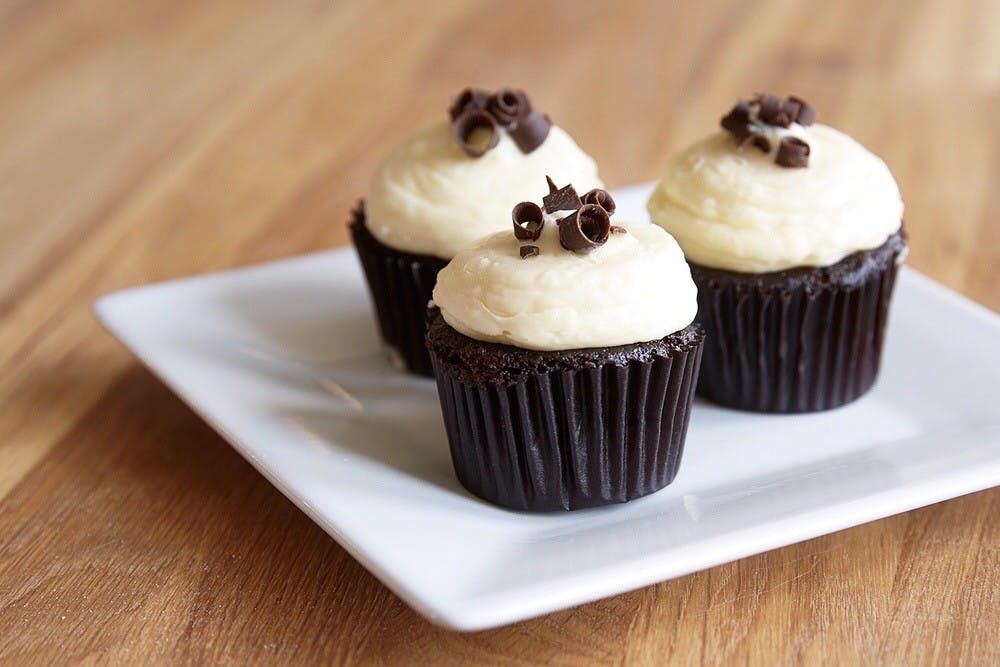
The pandemic also opened the door for Green to try something new: leading a virtual class. Before the pandemic, he led private decorating sessions at Audrey Claire Cook in Center City, during which he would curate a seasonal menu, give people tips, and let them try the desserts.
“This is something just a little different, but pretty much the same,” Green said. “It’s the same type of content, same information, for people that may want to decorate cakes, whether it's personally or professionally.”
In light of the Black Lives Matter movement, more people have reached out to Green to express their support for Affinity Confections. The movement has also led Green to reflect on the difficulties minority business owners sometimes face, such as lending and obtaining funding. But, overall, he still loves being an independent business owner and the freedom that comes along with it.
“I have autonomous creative control to be able to do with whatever I want to do,” Green said. “That allows me to experiment with flavors and textures and implement new things in different ways.”
Affinity Confections' production facility is located in West Philadelphia at 310 S. 48th St.
Hakim's Bookstore
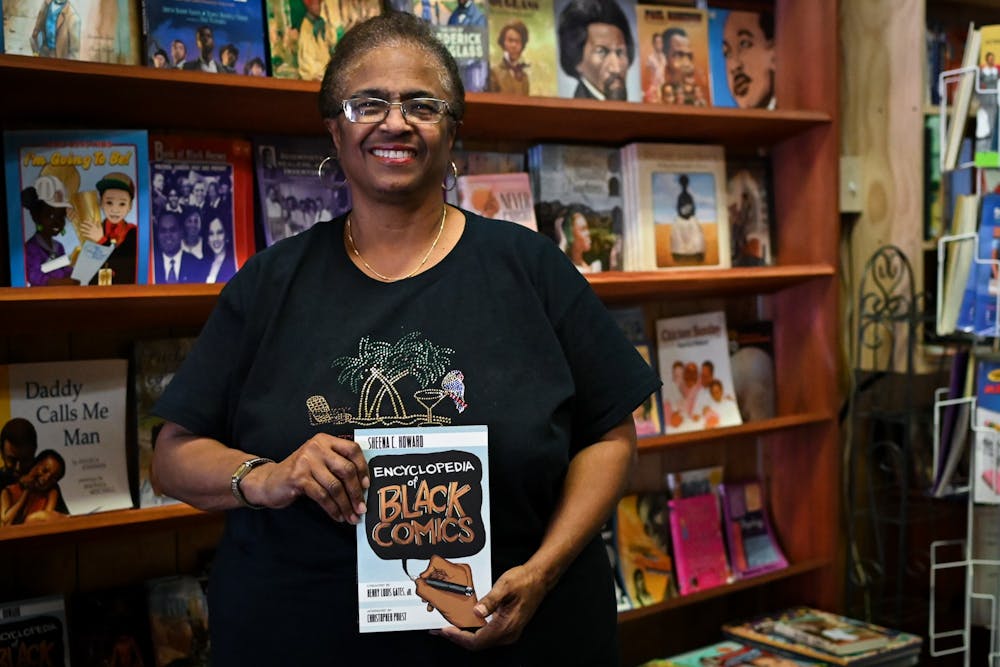
In 1959, Dawud Hakim opened Hakim's Bookstore in West Philadelphia with the intent to educate people about Black history. At the time, it was rare to find a shop in the United States that exclusively sold books about African American history and culture. Now, it stands as the first and oldest African American bookstore on the East Coast.
When Hakim passed away, his daughter Yvonne Blake took ownership of the business and has been running it ever since. The bookstore has also received immense help from her granddaughter, Alanna Ramberan, and Chris Arnold, who’s been volunteering at the bookstore for five years.
Forced to temporarily close Hakim’s Bookstore in March due to COVID-19, Blake said she was concerned that the shop would not be able to outlast the shutdown, even after receiving grants from the Book Industry Charitable Foundation and the Philadelphia Merchants' Fund.
But once the rekindled Black Lives Matter movement prompted nationwide attention onto Black history and culture, orders came pouring in. From Black parents requesting books that depict Black characters for their children to individuals ordering anti-racist literature, Hakim’s Bookstore has been met with widespread support from the Philadelphia community and people across the nation.
Hakim's Bookstore is located in West Philadelphia at 210 S. 52nd St.
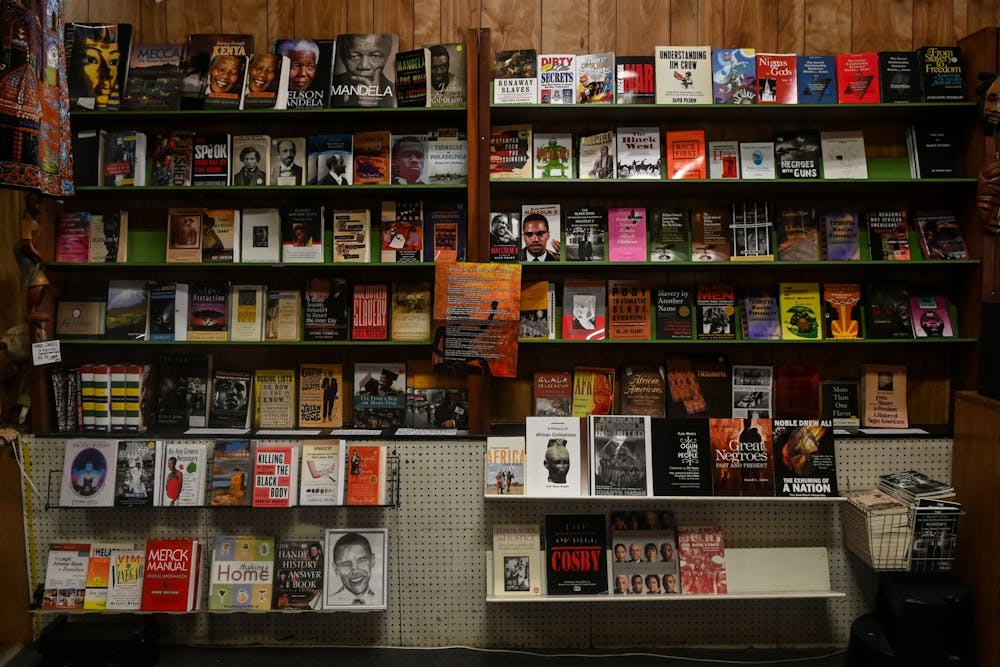
The Daily Pennsylvanian is an independent, student-run newspaper. Please consider making a donation to support the coverage that shapes the University. Your generosity ensures a future of strong journalism at Penn.
Donate




Most Read
More Like This